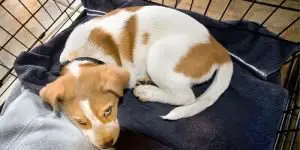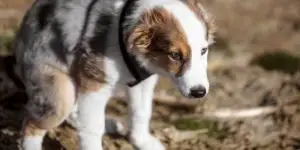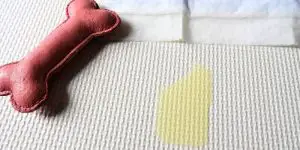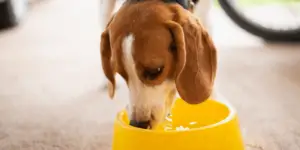
What should your puppy's poop look like - And Why It’s Important
- Written by Dr. Cristina Vulpe
- Last updated
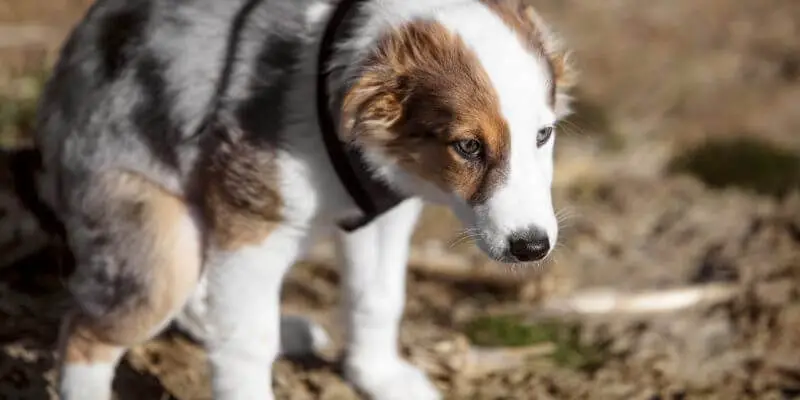
Key takeaways
- Chocolate brown is normal. Any other colors besides chocolate brown can be considered a sign of disease or a health complication.
- A firm consistency is preferred. While your puppy’s poop should not be hard, it should also not be watery.
- Your dog’s feces should not be coated. In conditions like pancreatitis, the poop can be covered in grease, while in digestive issues, it can be covered in mucus.
- The smell should be mild. Any pungent smells could be a sign of a gastrointestinal infection or other health complications.
- The poop should not contain any worms or foreign objects. Fur and undigested food are not normal, either. .
In this article
How to Tell if Your Puppy’s Poop Is Normal?
The standard color of a perfectly healthy puppy’s poop should resemble that of chocolate. The fecal matter should be compact and integral and look a bit like a log.
Anything different in terms of color, consistency, actual content, or coating should worry you a bit as a pet owner.
Why Is It Important?
Puppies’ bodies are far more sensitive compared to those of their healthy adult counterparts. Depending on their age, their immune system might not have fully developed, which means that they can quickly become the victims of infectious and non-infectious diseases.
Occurrences such as diarrhea can quickly dehydrate a young puppy, especially at ages such as 7 weeks. Even at 12 weeks, you can’t consider your puppy in the clear, especially if the vaccination schedule did not go according to plan and your dog still needs to receive a few shots.
Your puppy’s poop can give you some clues as to whether their internal organs are functioning properly, whether that be their gastrointestinal tract, or organs such as the liver or the gallbladder, for example.
Poo Color
Any other tone besides chocolate brown can be a sign of disease, indigestion, or just a momentary complication.
| Poo color | Explanation |
|---|---|
| Black | All of these can mean different things, but they should also convince you to call your veterinarian as soon as possible. Black poop can be quite concerning since it’s an indication that there is bleeding somewhere in the digestive tract. |
| Red | Red streaks are almost always a clue that the bleeding is happening in the large intestine, whether that be in the colon or anywhere else. |
| Green | Green poop could be an indication that your puppy tends to eat grass. This behavior isn’t too worrying or fully normal, so you shouldn’t feel 100% alarmed. Even so, it could be a sign that your dog is not getting the proper nutrition, so they might be at risk of developing pica, a condition where they eat things they’re not supposed to. |
| Yellow or Grey | Gray or yellow colors can mean two things – either your pet has a health issue relating to their gallbladder or liver, or something is wrong with their pancreas. Food sensitivities might also cause such colors every now and then, so you should see whether an elimination diet might not offer good results. |
| White | This color could be the result of several different things. Your puppy might be eating something that doesn’t get digested, such as tissues or toilet paper. White spots can also be parasite eggs or larvae, in which case you’d need to deworm your puppy as soon as possible. If your dog is getting more than enough calcium from their diet or supplements, white faeces might be normal, too. |
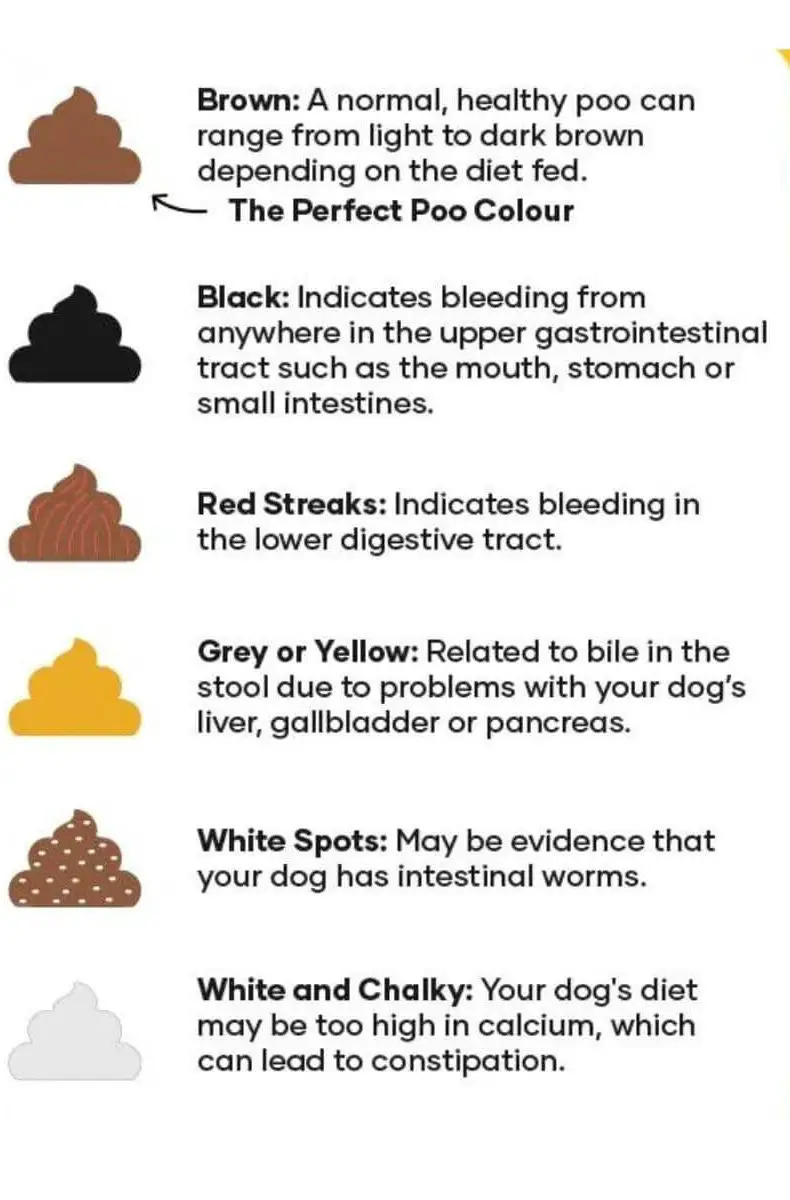
Source: https://www.petbarn.com.au/
Consistency
While your pet’s poop should always be firm, it should never look like a rock. You shouldn’t see your puppy strain and try to defecate time and again with little to no results.
On the other hand, you should also not see your dog passing soft or downright diarrheic stools because this could be a sign that something is wrong with their health.
During the first 6 months of their life, you should always make a point out of analyzing your dog’s poop, as awkward as it might seem to you.
Puppy Diarrhea
Diarrhea can be a common occurrence in young dogs, and the worst thing about it is that it can lead to very severe complications in a surprisingly short amount of time.
Puppies can experience diarrhea as a result of bacterial or viral infections, but also because they might have parasites, they might have ingested a foreign body or a toxic substance, or just because they are stressed.
Whenever your dog gets diarrhea, try to seek out veterinary assistance immediately. Time is of the essence, especially in cases where the puppy can quickly get dehydrated.
Smell
A mildly noticeable odor is what you’re looking for when you’re paying attention to your dog’s elimination patterns. Any type of smell that’s foul or extremely pungent should make you feel a little concerned.
Strong poop smells can appear in somewhat physiological situations, though, such as when the pet is fed a raw diet or a poor-quality one. But a really bad smell can also be a sign of a severe infection.
Coating
Ideally, your puppy’s poop should never look like it’s coated in any kind of mucus or grease. While mucus could indicate a problem with their digestion, such as a food intolerance or even a food allergy, grease is something to always be worried about.
When your dog’s poop starts looking greasy, you should immediately take them to the vet. Whether their food is too rich in fat or not, this sign could be an indication that they are suffering from pancreatitis, which can be a life-threatening condition.
Amount
Young puppies, such as those that are only a few weeks old, are known for going potty pretty much all the time.
As they age, though, they will begin to pee and defecate a lot less frequently until the point that they can hold it in so that elimination happens only twice or three times a day.
If your pet gets food all the time and they eat a lot, you can expect both an increase in the amount and pooping frequency. If your pup poops undigested food, they might have a form of malabsorption or some other health condition, so they need to be seen by a vet.
Watch: Poo color and consistency explained
Credit: Top Dog Tips
What to do when your pup’s poop is irregular
Something Irregular could mean changes in the defecation frequency or amount, or changes in color, consistency, coating, or smell, but the best way of going about things in all of these situations would be for you to call your vet.
Puppies can be quite sensitive to a variety of factors because their little bodies are still growing – so they do not have the same self-defense mechanisms that healthy adults’ bodies are equipped with.
Irregular or inconsistent bowel movements could be the consequence of anything ranging from constipation to parasites or liver health issues.
How to encourage healthy pooping habits
Unlike cats and other animal species, dogs are considered omnivores, which means that besides the primary protein sources that they should get as a part of their normal diet, they should also receive a little fat and enough fiber.
The problem with most commercial dog diets these days, including those made specifically for puppies, is that they are not made with the best ingredients. Subsequently, some of the kibble you might be interested in getting for your pet might contain wheat, corn, or other fiber sources that cause digestive distress.
Healthy fiber sources can be considered sweet potatoes or pumpkin, for example, along with a few legumes if your dog tolerates them well.
But as you probably know, dogs are not herbivores or ruminants, so they shouldn’t eat things like corn, oats, wheat, or barley. Of course, some pets might be able to get used to such diets without suffering from indigestion every now and then, but that does not mean that they are species-appropriate.
Adding more fiber to your dog’s diet usually promotes normal bowel movements – but make sure you use only healthy sources.
Another way to ensure that your dog’s poop is normal is to give them probiotics. There are quite a few alternatives, in this case, these days, and the bacterial cultures present in these products can ensure that your dog’s digestive system functions properly.
Protecting your puppy’s intestinal microbiota is essential for their immune system, too, not just for their gastrointestinal health.
When to call the vet
You should get in touch with your local veterinarian each time you notice any significant change in your dog’s stool. If you are already used to it, you could deworm your puppy by yourself, especially if your vet already instructed you on how to do it.
But for any other modifications in terms of consistency, color, smell, or coating, you should always take your puppy to the animal hospital. Having them seen by a professional is almost always better than attempting any treatment at home.
References:
- https://www.akc.org/expert-advice/health/puppy-diarrhea/
- https://www.ncbi.nlm.nih.gov/pmc/articles/PMC5089601/
- https://www.ncbi.nlm.nih.gov/pmc/articles/PMC3564131/
- https://pubmed.ncbi.nlm.nih.gov/22520179/
- https://www.ncbi.nlm.nih.gov/pmc/articles/PMC7059695/
- https://www.ncbi.nlm.nih.gov/pmc/articles/PMC7151799/
- https://www.ncbi.nlm.nih.gov/pmc/articles/PMC5029830/

Written by: Dr. Cristina Vulpe
Dr. Cristina Vulpe is a certified veterinarian who graduated in 2011 and earned her PhD in canine oncology in 2015, with a thesis focused on the diagnosis of abdominal tumors in dogs.


